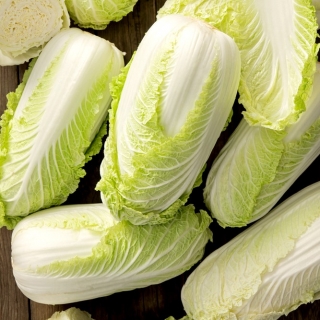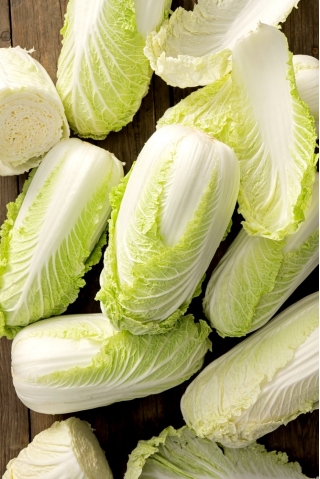The Pacifiko F1 BIO napa cabbage seeds offered here come from seasonal cultivation at organic seed farms. Their production is strictly supervised and only natural growing methods are allowed. The use of artificial fertilizers and plant protection agents has been eliminated from the process. Seeds grown the natural way germinate very well and bring higher yield that is more nutritious and delicious.
The Pacifiko F1 variety is exceptionally productive and resistant to shooting flowering stalks. It produces cylindrical, green, closed heads. It stands out with high resistance to tip-burn when grown in the summer. Presented vegetable tolerates long-term storage well. It can be grown from seedlings or from direct sow onto the field during the entire season, from April to August. Its vegetation period lasts 63 days. The first harvest-ready heads appear in July, the last ones in October.
Heads of the Pacifiko F1 napa cabbage stand out with an excellent taste and high nutrients' content. The main advantage of the presented cultivar is its high concentration of easily available protein. It also supplies the body with a substantial amount of vitamin C, carotenoids, and minerals, such as calcium, iron, and phosphorus. The Pacifiko F1 napa cabbage is a multi-purpose vegetable that tastes great in all kinds of salads. It can substitute the traditional white cabbage. It can be stuffed, roasted, and steamed. You can also pickle napa cabbage like the famous sauerkraut or the Korean way, as the savoury kimchi.
One package contains ten seeds. Basic plant facts and growing tips can be found at the back side of the packaging.
- Use: raw in salads; as substitute of white cabbage - pickled, stuffed, steamed
- Harvest time: 63 days after planting, July to October
- Growth form: cylindrical, green, compact heads
- Quantity: 10
GardenSeedsMarket - has been in business for more than a decade and from the very beginning we have made the quality of our products the top priority. Throughout the years we have delivered the best quality goods to tens of thousands of customers from all over the world. Their satisfaction proves that we had chosen the right way.
All seeds we sell are subject to a multi-level quality control checks and only then are carefully packed and dispatched. Our products have been awarded numerous certificates and comply with the highest standards of the European Union. Our employees are experienced gardeners who are more than happy to answer your every question.
Where do our seeds come from?
All of the seeds sold in our shop come from the best producers from across the European Union. Thanks to a long-standing cooperation with them we were able to develop the most adequate storing and dispatch conditions, guaranteeing that you always receive fresh and carefully tested batches of seeds. Exclusion of the middlemen from the whole process not only makes it possible for us to avoid sending out-of-date seeds that might have been lying too long on a warehouse shelf, but also ensures the most attractive price for top quality products.
The quality control process
All our seeds must pass a four-stage quality control process.
Stage one begins with a careful selection of the suppliers. Than we proceed with controlling their crops, foreign producers are not excluded from the quality control process. Plants are checked at every stage of their development: when they start to grow, during blooming and when they start bearing fruit (seeds). At this stage the most important thing is to ensure proper spacing of the plants. Thanks to that obtaining the desired morphological characteristics of each particular species or variety, such as colour, height and shape, can be ensured.
Stage two consists of a detailed verification tests in laboratory conditions. With the use of the highest quality equipment by the highly qualified staff, our suppliers perform more than 30 000 quality checks annually. The seeds that do not meet our requirements are subject to technological refining processes, including drying, cleaning, upgrading and testing again.
Stage three starts with sowing seeds in selected control plots. That way we obtain valuable, exact information concerning their germination that must be maintained at an appropriate level. Simultaneously, the varietal identity of each species is checked at this stage.
Stage four takes place in our warehouses and consists of eliminating seeds that have been stored for too long on our shelves and replacing them with new batches. Each package is stamped with a unique batch number and also with the sow-by-date.
All four stages combined allow us to state with confidence that the seeds we deliver comply with the highest standards and have completed all required control stages with flying colours.
Prizes and awards
The seeds we sell are widely recognized for their quality and have won many awards. Our seeds won numerous gold medals and distinctions for their high quality. The World of Flowers was also honoured for its innovative approach.
Among those awards there were: TOP INNOVATION (June 2015), GOLD MEDAL AT THE POZNAN INTERNATIONAL FAIR (2015), CONSUMER QUALITY LEADER (2014), FARMER OF THE YEAR (2014).
In addition, we have also been awarded the “IDEAL BUSINESS” certificate for two years in a row.
Germination
We are committed to selling only the highest quality seeds. Taking into consideration the efforts we make daily, please also note that plants are living organisms and their germination and growth depends on many factors, such as temperature, soil type, humidity and the frequency with that they are watered, sowing time and conditions, use of fertilizers and plant protection agents (pesticides), as well as weather and climate conditions. We provide help by sharing the accurate and up-to-date sowing and growing information, however, we cannot bear any responsibility for the plants that were not cultivated in conditions appropriate for given species.







